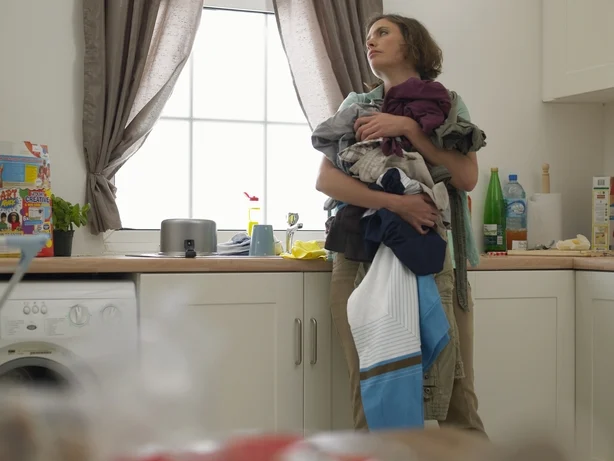Dr. Caroline West is a sex educator and host of the Glow West podcast, which focuses on sex, sexuality, and the body. Here, she writes about the danger of falling into 'mothering' your partner.
Looking after our partners can be a joyful experience as we encourage each other to grow and achieve our potential. However, it's hard to keep the cute aspects of romance alive when you are internally fuming inside because of how they don't seem to know what a hoover does or know that bedsheets need to be changed more than once a month.
In cases like these, the mothering that will naturally occur to some level in relationships, becomes smothering and draining to all parties if left to continue.
As women, we are often socialised to put others first - even at the expense of ourselves. It's common in some cultures for a man to go straight from living at home with a mother looking after him, to a wife who picks up where the mother left off.

Often viewed as or assumed to be 'natural’ caregivers, women often form the bulk of paid and unpaid care work across the world. While nurturing and caring for others can be an enriching and enjoyable part of a woman's life, this framing of what a woman should be and what a ‘good’ woman should be can limit women in so many ways, reducing us down to only what we can do for others. Housework and the maintenance needed to keep life in balance therefore became part of ‘women’s work’.
The ‘need’ to mother men is also propped up by our culture, which excuses male behaviour from childhood onwards with a ‘boys will be boys’ approach, one that paints women as the housekeeper and homemaker and the man as the clueless-but-lovable house inhabitant.
We can see this in ads on television that paint men as inept and needing a woman to clean the house properly, or within our society that refers to fathers as 'babysitters', and praises single fathers who make TikToks about doing their daughters hair, but call single mothers the scourge on society.
That patriarchal pressure on men to leave ‘women’s work’ to women also crushes women. It's hard to balance our expectations in a relationship with what our parents tell us to do, what their parents told them, and what society expects women to do and act like. This frustration turns each laundry load left undone into a catalyst for an explosion as it simmers under the surface and suddenly, the argument isn't about the laundry anymore.

Men are set up for failure by parents who don’t raise them to know how to take care of a house, but they are often set up for emotional failure too. Teaching boys that it's not OK to cry or show emotion other than anger leaves them emotionally stunted and at a disadvantage when it comes to communication in an adult romantic relationship.
This dynamic will also impact a couple’s sex life: who wants to be intimate with someone who shows disrespect outside of the bedroom? If you have to be the one who takes a more adult role, that's not conducive to viewing your partner as an attractive, desirable, independent adult who has their act together.
Is the future this grim: once a manchild, always a manchild?
There is hope - if the person recognises there's an issue, and takes the steps to address it. They need to put in the work to, well, grow up, and if they don’t, they will continue the cycles of partners getting fed up with their immaturity and leaving them.
We can have empathy for people who don’t know how to do the basics, but then they need to step up. Youtube exists, and if they need to know how to do something, there's a million videos that will exist on any niche topic, so they really don’t have any excuse to keep behaving like this once they are aware of it.

If you're stuck in this rut and power dynamic, you can either keep going and let that resentment simmer away or be proactive. Tell your partner how you feel, and if they continue without changing, that is them telling you that they don’t care if their actions make you upset. It's then your choice to do what you want to with that recognition.
If it's a bit of a stumbling block, can your budget stretch to a cleaner? They usually charge around minimum wage, and so for what may be a manageable cost, you can save hours of stress and another few knocks to your relationship.
The potential for weaponised incompetence to be used in this situation must be acknowledged. This trick is when someone doesn’t want to do a chore and pretends to be so bad at it that they won’t get asked again, since the other person gives up and thinks that it's just easier to do it themselves rather than have to re-do it anyway later or get into an argument.
Is this simply an ingenious way to get out of doing the dishes? No; it is abuse and manipulation and somebody saying ‘I don’t care about you’ to you, through their actions. There may be other signs of abuse present if their behaviour and words were looked at through this lens.

Are they blaming you for things that they need to take accountability for? If they are always late for work if you don’t get them up, or don’t eat well unless you make the food, or don’t have clean laundry unless you do it, they do not see you as an equal partner, they see you as a caregiver, one that they are entitled to.
Some research says that ‘chore-play’ helps a relationship: this occurs when partners do chores motivated by the promise of sex. However, it's easy to see how that would lead to resentment; your partner shouldn’t need a bribe in order to iron the clothes and using sex as a reward can be complicated, and have an impact on intimacy levels, consent, and desire too.
When is it time to cut the cord and encourage mutual work and independence? When they have the chance to do better and continuously choose not to, and when you want a relationship with a functioning adult that's rooted in respect, not inequality.
If you have been affected by issues raised in this story, please visit: www.rte.ie/helplines.



